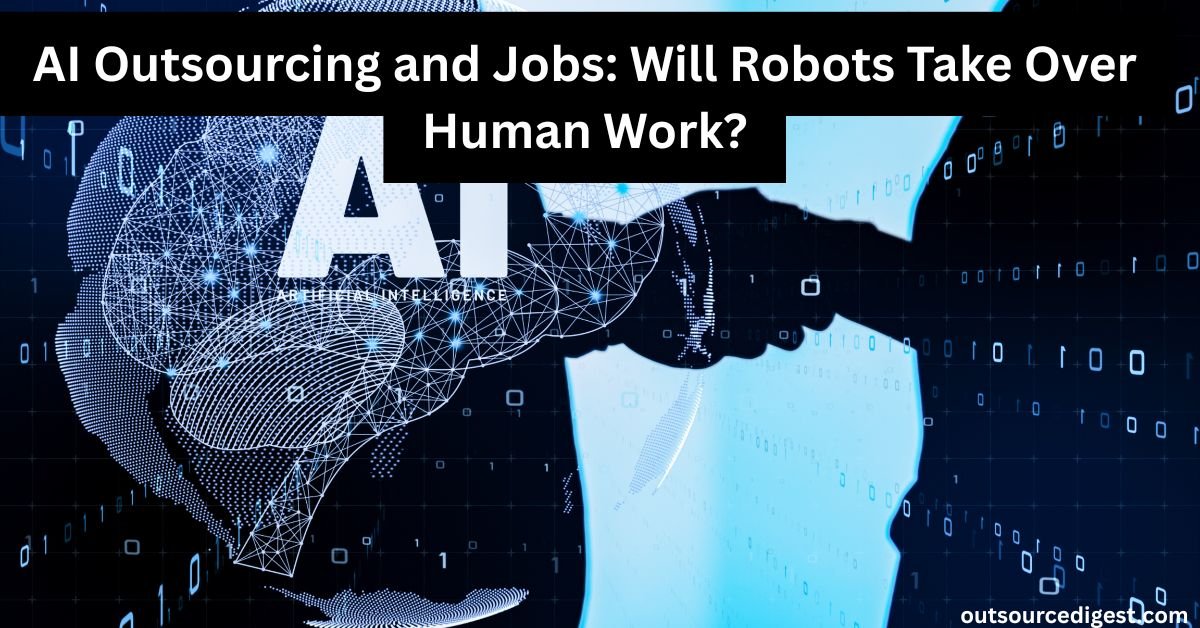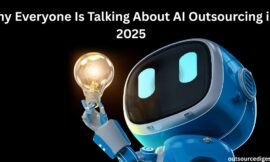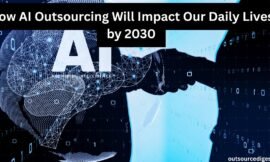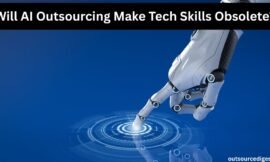For decades, people have worried about machines replacing human jobs. Now in 2025, AI outsourcing has brought that fear to the forefront. Businesses are rapidly adopting outsourced AI solutions for everything from customer service to data analysis, raising a critical question: Will robots take over human work?
- What Is AI Outsourcing and Why Does It Affect Jobs?
- Jobs Most Affected by AI Outsourcing
- Jobs Created by AI Outsourcing
- Will Robots Replace Humans Completely?
- The Skills Workers Need in the Age of AI Outsourcing
- Industries Most Impacted
- The Global Impact: Offshore and Nearshore AI Outsourcing
- Risks of Overreliance on AI Outsourcing
- The Future of Work: Collaboration, Not Competition
- Conclusion
The answer isn’t as simple as “yes” or “no.” AI outsourcing is transforming the job market, creating both challenges and opportunities. Let’s break down what’s happening, why it matters, and what the future of work looks like in this new era.
What Is AI Outsourcing and Why Does It Affect Jobs?
AI outsourcing means delegating artificial intelligence-related tasks to external providers, whether that’s specialized vendors, offshore teams, or AI-powered platforms. Instead of building AI in-house, businesses rent or buy these services.
This shift matters for jobs because:
- Tasks once handled by humans are now managed by machines.
- Companies are restructuring teams to work alongside outsourced AI.
- Entire industries are redefining the skills they need.
Jobs Most Affected by AI Outsourcing
Not all jobs are equally at risk. Some are highly automated, while others rely on creativity, empathy, or strategic decision-making.
- Administrative and Routine Work
Data entry, scheduling, and simple reporting are already heavily outsourced to AI.
Chatbots and virtual assistants reduce the need for large support teams.
- Customer Service
AI-powered call centers and outsourced chatbot providers are replacing parts of traditional support roles. While humans are still needed for complex cases, entry-level positions are shrinking.
- Content Generation
With outsourced AI tools producing articles, ads, and even video scripts, freelance writers and junior marketers face tougher competition.
- Manufacturing and Logistics
Robotics outsourcing, combined with AI, automates supply chains, warehouses, and quality control, reducing demand for repetitive manual labor.
Jobs Created by AI Outsourcing
Here’s the side of the story that doesn’t get enough attention: AI outsourcing is creating new roles.
- AI Project Managers
Coordinating between vendors, AI systems, and company teams is a new skillset in demand.
- AI Integration Specialists
Companies need people who understand how to blend outsourced AI solutions with existing workflows.
- Prompt Engineers and AI Operators
Even outsourced AI needs human direction. People who know how to “talk” to AI systems are becoming highly valuable.
- Data and Ethics Consultants
As more work gets outsourced, businesses rely on experts to ensure data privacy, ethical practices, and compliance.
Will Robots Replace Humans Completely?
The short answer: no, but roles will evolve.
AI outsourcing is excellent at automating repetitive and predictable tasks, but it struggles with:
- Human emotions and empathy.
- Complex decision-making in uncertain situations.
- Creativity that requires a deep cultural or social context.
Instead of a total replacement, we’re witnessing a reshaping of the workforce—where humans focus on strategy, creativity, and relationship-building, while AI takes on the repetitive heavy lifting.
The Skills Workers Need in the Age of AI Outsourcing
If you’re worried about being replaced, the key is upskilling.
Top skills in demand include:
- Critical thinking: analyzing AI outputs and making smart decisions.
- AI literacy: understanding how AI tools work and how to use them effectively.
- Project management: coordinating outsourced teams and AI vendors.
- Human skills: empathy, creativity, and communication remain irreplaceable.
Workers who combine these with technical adaptability are thriving.
Industries Most Impacted
Healthcare: AI outsourcing supports diagnostics and scheduling, but doctors and nurses remain irreplaceable for patient care.
Finance: Banks outsource fraud detection and risk analysis to AI providers, yet financial advisors and compliance officers are still essential.
Education: Outsourced AI tutors supplement teachers but cannot replace the human touch in guiding students.
Media and Marketing: AI-generated campaigns are everywhere, but human creativity still drives storytelling and branding.
The Global Impact: Offshore and Nearshore AI Outsourcing
Countries are becoming AI outsourcing hubs, offering talent at lower costs. For instance:
India and the Philippines lead in customer service AI outsourcing.
Eastern Europe and Latin America excel in nearshore AI development for Western markets.
The globalization of AI jobs presents both opportunities and challenges, as workers in developed countries compete with global providers.
Risks of Overreliance on AI Outsourcing
The conversation about jobs isn’t just about opportunities. Outsourcing AI brings risks too:
- Job displacement in vulnerable sectors.
- Dependence on vendors for mission-critical tasks.
- Data security issues arise when sensitive information is shared externally.
These risks fuel debates about how governments and businesses should regulate AI outsourcing.
The Future of Work: Collaboration, Not Competition
By 2030, most experts agree: the workforce won’t be “humans vs robots.” Instead, it will be humans plus AI.
The future lies in collaboration:
- Humans provide context, creativity, and judgment.
- AI handles scale, speed, and routine.
- Outsourcing bridges the gap by making advanced AI accessible to everyone.
Conclusion
So, will robots take over human work?
Not entirely. AI outsourcing is changing the landscape of jobs, not erasing them. While routine roles are being automated, new opportunities are emerging for those willing to adapt.
The winners of this transformation are not those who resist AI outsourcing but those who learn how to work with it, manage it, and build on top of it.
In 2025, the key question isn’t “Will robots replace us?” but rather “How can we evolve alongside them?”





